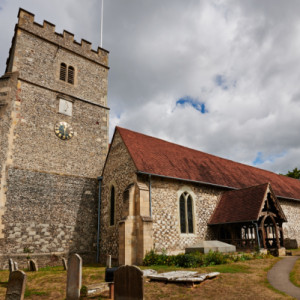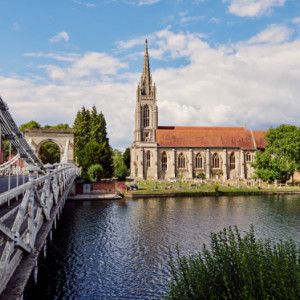The Jurors
Mono Monday: Joint
This morning saw us visit Cookham and the Spencer gallery there. A total delight. For me, above all a chance to marvel again at what he accomplished with the 1914 self portrait. But there were so many other delights too... My first extra is the 11th Century Church at Cookham - scene of several Spencer paintings.
On then, like the 3 men in a boat, to Runneymede. Finally returning back up river to Marlow, there is a shot of the suspension bridge and Marlow Church. The bridge is by the same architect that designed the chain bridge that links Buda and Pest (still) in Hungary.
The main shot is the sculpture "the Jurors" by artist Hew Locke which can be found at Runnymede, the site of the Magna Carta. The sculpture was commissioned for the 800th anniversary of that momentus event that gave birth to the modern concepts of human rights and democracy. I very much doubt that the Barons realised what they were starting back in 1215 when they got King John to sign their parchment.
Jury trial brings with it the requirement for a joint or collective finding on the facts of the case. In the UK the requirement for all 12 jurors to reach a unanimous decision was amended to provide for a 10-2 majority to try to make it more difficult for jury tampering to succeed.
The sculpture celebrates jury trial and the fight against justice and inequality. The piece, consists of 12 bronze chairs placed in a circle around an invisible table – a direct reference to Clause 39 of Magna Carta, which states that no man can be imprisoned “except by the lawful judgment of his equals or by the law of the land”. Each chair features embossed images on front and back, which document the continuing struggle for freedom and equal rights – as well as abuses of those – from the suffragettes and the suffering of the Australian aborigines to the assassination of gay activist Harvey Milk, the ongoing migration crisis on European seas and even Pussy Riot.
...and as this was a visit to Runnymede - so to Kipling. The poet Kipling has a mixed reputation nowadays. For the last 50 years or so he has very much been seen as a jingoistic imperialist. It is hard to argue against that verdict. But he is perhaps becoming a little more acceptable nowadays for those that wish to understand how empire was experienced.
At Runnymede, at Runnymede
What say the reeds at Runnymede?
The lissom reeds that give and take,
That bend so far, but never break,
They keep the sleepy Thames awake
With tales of John at Runnymede.
At Runnymede, at Runnymede,
Oh, hear the reeds at Runnymede:--
"You mustn't sell, delay, deny,
A freeman's right or liberty.
It makes the stubborn Englishry,
We saw 'em roused at Runnymede!
"When through our ranks the Barons came,
With little thought of praise or blame,
But resolute to play the game,
They lumbered up to Runnymede;
And there they launched in solid time
The first attack on Right Divine--
The curt, uncompromising 'Sign!'
That settled John at Runnymede.
"At Runnymede, at Runnymede,
Your rights were won at Runnymede!
No freeman shall be fined or bound,
Or dispossessed of freehold ground,
Except by lawful judgment found
And passed upon him by his peers.
Forget not, after all these years,
The Charter Signed at Runnymede."
And still when Mob or Monarch lays
Too rude a hand on English ways,
The whisper wakes, the shudder plays,
Across the reeds at Runnymede.
And Thames, that knows the moods of kings,
And crowds and priests and suchlike things,
Rolls deep and dreadful as he brings
Their warning down from Runnymede!



Comments
Sign in or get an account to comment.


